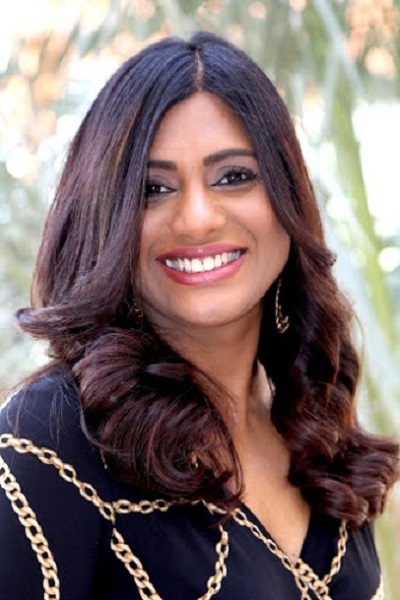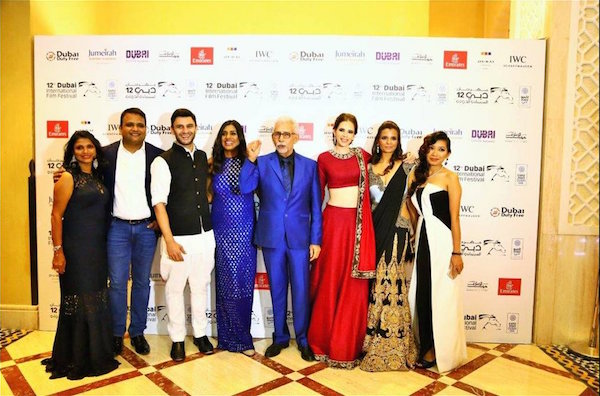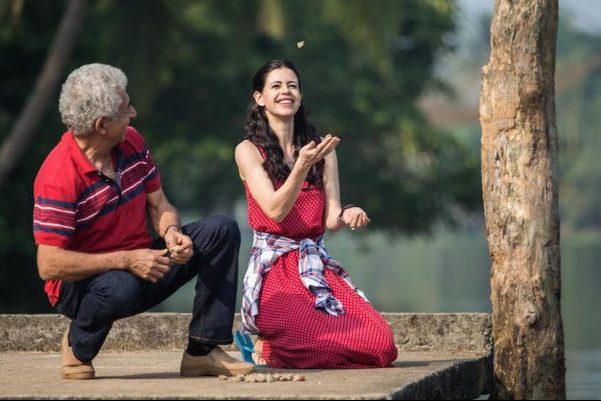Waiting is based on a personal experience – Anu Menon
Advertising professional turned filmmaker Anu Menon made her Bollywood debut with a commercial romantic movie London Paris New York in 2012. Her upcoming film Waiting starring Naseeruddin Shah and Kalki Koelchin is traveling across festivals and getting rave reviews from both critics and audience alike. The movie is now chosen as the closing film of the 14th Indian Film Festival of Los Angeles (IFFLA). Ahead of the festival, Anu spoke to Pandolin about her personal experience that inspired the movie, her upcoming stint with the television format and more.

Anu Menon
Your film Waiting has been chosen to close the Indian Film Festival of Los Angeles (IFFLA). How does it feel?
I am quite pleased. I thought it was a really nice gesture. Hopefully, a lot more people will see the film. And I really like the line-up of the films at the festival. It seems to have a good energy about it.
READ: INDIAN FILM FESTIVAL OF LOS ANGELES ANNOUNCES 2016 DISTINGUISHED JURY MEMBERS
What are your expectations from the festival?
It seems to be a very filmmaker-friendly festival. They have set up a whole lot of meetings with the industry people. This festival seems to be more about helping filmmakers and connecting them to the industry and getting them to interact with each other. So, I like the vibe of this festival. Honestly, right now I am so busy with finishing the film as we are going to release it in the next month. And I am just hoping that we will be able to create some buzz, which will help us with our release back at home and take international distribution to the next level.
What is the kind of impetus a film gets by traveling to various festivals? Which other festivals is the film traveling to?
For me, it’s actually been a big journey. For my first film London Paris New York, I just had to make the film and somebody else did all the work. But for a film like this (Waiting), it’s been a very different journey. It’s tricky because there is much going on, so it’s a bit confusing. When you make a film, you need to understand where you’re placed in that whole cosmos of the festival. Because it’s as complicated as distributing a film. Every festival is unique; every festival has an idea of what kind of film they want to show. In that sense you should not become a filmmaker who says that we don’t want to make a film depending on what the audience wants nor should you become a filmmaker who makes a film to fit a festival. I am still finding my way through it.
But when our film got selected in the Dubai Film Festival, it was a fantastic experience for us; we got really good reception and reviews. It was very satisfying and it helped us create awareness as the film got certain validation from the audience. Ultimately, as a filmmaker, you want your film to reach out to a lot of people and to me a festival is one such means. After you make one or two films that are targeted to the international audience, then you understand what exactly will work for the film and you.
READ: IFFLA HAS A HISTORY OF IDENTIFYING NEW TALENT – CHRISTINA MAROUDA
What is the concept of Waiting and how did the birth of this idea happen?
The film is based on a personal experience. My father was unwell and I was in the hospital for a very long time. And it was something that I wanted to explore. So that milieu and the experience translated into a story, which was about two people who are completely different but are in a similar kind of a situation and how they face it and help each other. That’s how the story came about. In the movie, these people come from different stages of life and have different viewpoints; in spite of that, they are the only two people who understand each other. When you’re in a situation which no one else gets, it creates a different kind of empathy. So, the story explores what does it really mean to love someone, to have courage and find support in an unknown person.
How would you define the visual and creative treatment adopted for the film?
When you’re shooting a film in a hospital, you are already limiting yourself. If you see the film, you will feel that it’s quite visual for a film that’s based in the hospital. We had a very distinct colour palette. Also, we have taken subversive choices in how one takes close-ups, when do you pull-out etc. Neha Parti Matiyani who is the DOP is very good with her (camera) operating and the film is very sensitively operated. For everything in the movie, there is a certain take on why a shot is the way it is.

Team of Waiting at the Dubai International Film Festival
Was Naseeruddin Shah the first choice for the role and why? How easy/difficult was it to get him on board?
There are only two actors who read the script – Naseer and Kalki (Koechlin). It just so happened that when I first met Kalki, she loved the script and was on board. With Naseer, it took us a while because we couldn’t reach him as he was busy. After about a month and a half or two, I got a mail from him which said, “I got your script yesterday and once I started reading it, I couldn’t stop it. I think it’s amazing; I would very much love to do the film.” And just like that, he was on.
READ: NONE OF MY FILMS ARE FOR THE SQUEAMISH – Q
The film also marks Suhasini Maniratnam’s Hindi cinema. How did the casting for her character happen?
In the movie, she plays Naseer’s wife and we wanted someone authentic. Again, we had not approached too many people. For Waiting, the casting just fell into place. At first, she was not convinced plus she didn’t know me or what kind of films I make. And she said that she’s really not into Bollywood films. I had to tell her that it’s not a Bollywood film and is very different. Then, she called me one day and said, “Explain to me, why should I do the film.” I can’t remember what I said but she was convinced and said ok for the project. She is a director and a cinematographer herself, so she loved the energy on the sets and was pretty hands-on.
When did Drishyam Films and Ishka Films come on board for Waiting?
I knew Manish Mundra because he was producing X: Past is Present. I sent him the script when it was ready. He liked the script and when the actors came on board, he green-lit it. I met Priti Gupta from Ishka Films, when Drishyam was not formed. She also loved the script and agreed to be part of the film. By the time the film was made, Drishyam came into being and that’s when they came on board.
READ: WHO SAYS CONTENT-DRIVEN CINEMA CAN’T BE COMMERCIALLY VIABLE?
How was the response to the movie at the Dubai International Film Festival?
Dubai was fantastic. We had our world premiere there and had international press come and review the film. It was very encouraging to go out and show the film and both our shows were houseful.
Going back a little, tell us about your initial learning in making movies? Did you get any formal education for it?
Yes, I went to a film school. I was in advertising for a very long time and that’s when I had the epiphany so I went to London Film School and did my MA in filmmaking. I actually studied for 2-3 years and made lots of short films, documentaries, also DOP-ed, edited films and so on. Since I didn’t have any film background, I wanted to immerse myself in the craft in every which way. I graduated from school around 2007 and started making movies.
READ: MOCHI IS AN EVOLUTION OF MY OBSERVATION – SAQIB PANDOR
You’ve experimented with various film formats. How is it moving between these different formats of filmmaking?
Transitioning from short films to feature films was not difficult for me at all. Everything has a beginning, middle and an end, whether it’s a scene or a short film or a feature. I have not entered a feature length documentary and I don’t know if I have any plans for it but I am definitely considering television. I am exploring international television because I live in UK and that’s something I am quite excited about. It helps you sink your teeth in the character graph and small details about the character, which you don’t get the time for in a feature film.


